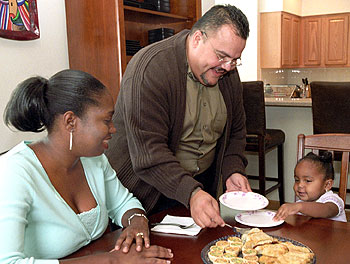While the new crop of first-year students may appear to get younger and younger every year to longtime members of the WUSTL community, the 2-year-olds running around the South 40 aren’t actually members of the Class of 2010.
They are the children of the newest faculty families living on the South 40.

Tili Boon Cuillé, Ph.D., assistant professor in the Department of Romance Languages and Literatures in Arts & Sciences; her husband, Lionel Cuillé, Ph.D., lecturer in the Romance Languages and Literatures and Comparative Literature departments and in the Interdisciplinary Project in the Humanities in Arts & Sciences; and their daughter, Elena, who is not quite 2, live in Danforth House in the William Greenleaf Eliot Residential College.
The Cuillés moved into their South 40 apartment in 2005.
The Torres family is the rookie on the field. Luis Torres, Ph.D., postdoctoral fellow in the George Warren Brown School of Social Work, along with his wife, Dernay Coley-Torres, and their 2-year-old daughter, Gabrielle, moved into their apartment in the Liggett/Koenig Residential College this summer.
The Cuillés and Torreses are the eighth and ninth families to accept the University’s invitation to live rent-free on campus for three years since the Faculty Family Program was started in 1998. Officially, their role is to integrate academic and residential life.
“We like the notion of bridging the distinction between the students’ and our own lives — curricular and extracurricular — and between the Danforth, the South 40 and St. Louis,” Tili Boon Cuillé said. “For us, this is a way to share our interests, which are often extensions of the subjects we teach, and to tap into the interests of the students.
“We have enjoyed sharing St. Louis’ rich cultural resources with them by taking them to the Tivoli Theatre, the Saint Louis Symphony, the Fox Theatre and the Touhill Performing Arts Center and discussing the trips over family dinners at our home in the residential college.”
Torres, who is conducting research in the area of co-occurring disorders, specifically mental health, substance abuse and HIV/AIDS, agrees.
“I’m loving it,” he said. “I love being in the middle of where everything is happening and being surrounded by the students.
“It’s a beehive of energy. It’s helping me in my own scholarly productivity and staying on my toes. These are really smart kids. Having my daughter grow up in her formative years on a college campus has a lot of appeal. It’s a wonderful thing.”
Both families have a variety of programming planned for the students in their residential colleges, including a documentary discussion series.
“Our programming has been centered around notions of exchange between cultures and disciplines,” Cuillé said.

“This fall we are launching a program called ‘Danforth Documentaries,’ in honor of our residence and the renaming of the Danforth Campus. Our series was inspired in part by themes arising from the discussion of (social work professor) Mark Rank’s book, One Nation, Underprivileged: Why American Poverty Affects Us All, during the Freshman Reading Program.
“We are inviting various members of the faculty and others affiliated with the University and the surrounding community to come talk to the students about documentaries that not only are noteworthy examples of the genre but treat a subject of national or international importance.”
Things are really “cooking” over at Liggett/Koenig Residential College.
“We have several programs in the works,” Torres said. “The first is ‘Cuisines of the World.’ With a group of 13 students we’ve selected a particular ethnic cuisine.
We are going to research a full menu, go shopping for the ingredients in the ethnic community we are going to explore and then cook the meal together and talk about what the experience has been like in interacting with people from another culture.”
Torres is also planning a panel discussion on the relationship between the University and the local African-American community and a trip for 35 students to the Missouri Botanical Garden.
Both Torres and Tili Boon Cuillé enjoy being able to get to know students outside of class.
“We have learned a great deal about their extracurricular interests, which has proven beneficial in planning programs that promote cultural, social and critical awareness,” Tili Boon Cuillé said.
“It has also had an invaluable impact on the classroom atmosphere as we can speak to or draw upon the students’ many passions and talents when leading discussions and designing our courses.”